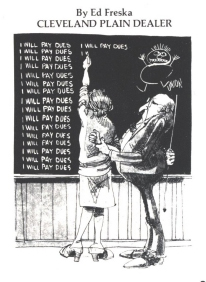Will Team Biden Weaponize Workers’ Pensions?
Big Labor abuse of worker pension and benefit funds as a means of advancing union bosses’ self-aggrandizing policy objectives is a familiar phenomenon.
 The American Thinker examines how big teachers union have become impediments for needed education reform:
The American Thinker examines how big teachers union have become impediments for needed education reform:
American public education may be in crisis, but teachers are fairly happy with their lives, according to a new Gallup poll:
The nation’s teachers score higher than almost all occupational groups on life evaluations plus four of the other five areas of wellbeing—including emotional health, healthy behaviors, basic access, and physical health. In life evaluations, emotional health, and basic access specifically, teachers come in second—trailing only physicians, who typically earn a much higher salary.
Teachers, however, were considerably less happy in their evaluations of their work environments. While they were the most likely to “say they smiled or laughed a lot yesterday,” their stress levels were second only to physicians, placing them in the bottom half for workplace well-being across 14 occupation groups:
Teacher’s low workplace wellbeing, relative to other professional occupations, indicates school and community leaders have important issues to address in the school workplace in order for teachers and students to reach their full potential. It is absolutely critical to raise teachers’ workplace engagement, because their engagement is the No. 1 predictor and driver of student engagement, which Gallup research shows impacts student wellbeing and academic success.
We couldn’t agree more. One problem that a lot of education reform efforts have is that they come across as anti-teacher. You can’t have great schools without great teachers, and the goal is to give good teachers more freedom to do what they do best.
Our idea of education reform isn’t to take teacher union membership away and leave teachers exposed to the power of uncaring, rigid bureaucracies. Instead, we want to use concepts like charter schools and school vouchers to give good teachers the chance to build cooperative and community schools where a reputation for excellence ensures a stream of students.
By acting like teachers are the problem or the enemy, education reformers often make their goals harder than they need to be. We don’t like teachers’ unions, but it’s not because we hate teachers and want them to suffer. It’s because the unions are part of what’s wrong with the system: They are the biggest defenders of the bureaucratized, by-the-book system that has stifled many teachers and made it difficult for them to do their jobs as they see fit.
We understand the appeal of unions to teachers. We understand why people under the rule of bureaucrats, who are ultimately responsive to big city political machines, would want to have their own representatives as the table. But we think there are ways to decentralize the whole system, to give teachers more autonomy and ground their evaluations more deeply in the views of their peers and local communities, while also giving parents more choice.
It’s not the teachers we want to disempower but the bureaucratic machines that seek to control them. Sadly, teachers’ unions have become a key cog in that machine. Pointing this out isn’t anti-teacher, it’s pro-teacher, and that is an important distinction for education reformers to make.

Big Labor abuse of worker pension and benefit funds as a means of advancing union bosses’ self-aggrandizing policy objectives is a familiar phenomenon.

Leaked CTU Proposals Won’t Do Anything to Improve Schools’ Poor Performance

What impact does handing a union monopoly power to deal with your employer on matters concerning your pay, benefits, and work rules have on your pay?